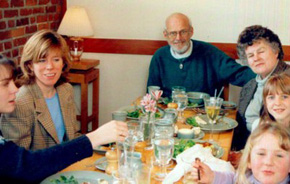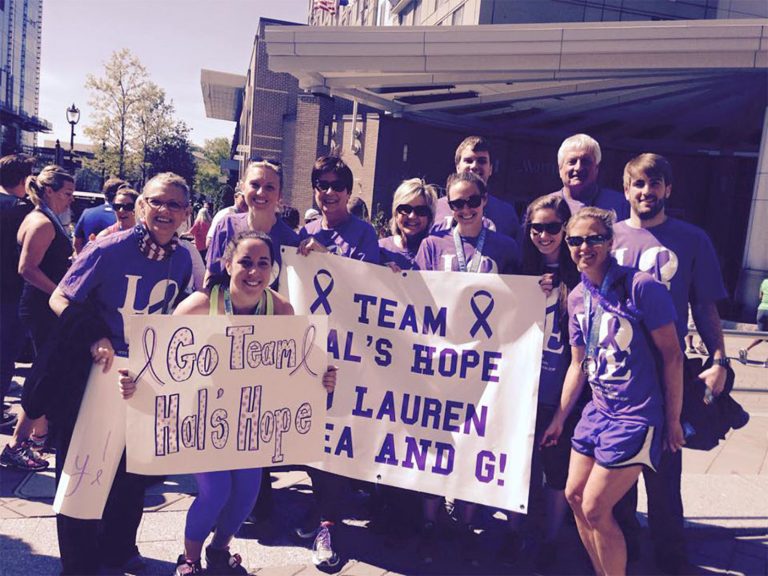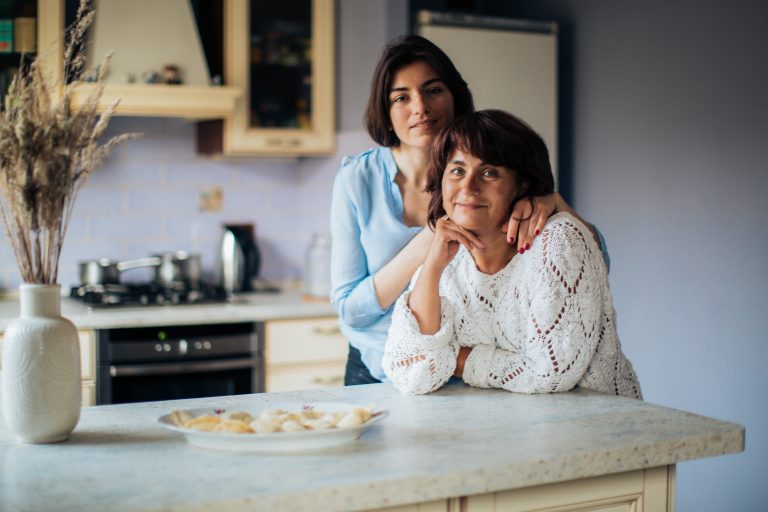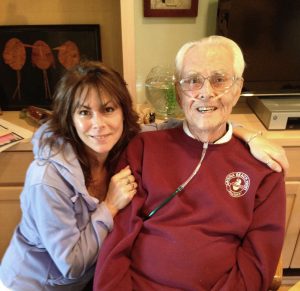Richard Philbin Story – December 2005
Vital Statistics
Richard Philbin was diagnosed with pancreatic adenocarcinoma in February 1998, at the age of 65. The tumor was 1.5 cm and found in the head of the pancreas. He underwent the Whipple procedure a month later. Chemotherapy was 5FU. Care was received at the Dartmouth-Hitchcock Medical Center, Lebanon, New Hampshire, in its NCI-designated Norris Cotton Cancer Center. His surgeon was Dr. Richard J. Barth; his oncologists were Dr. J. Marc Pipas and Dr. Herb Mauer. Richard’s primary caregiver, his wife Ginny Philbin, also contributes to this story.
Background
Richard and Ginny live in Quechee, Vermont – a small vacation/resort community, luckily just over the state line from the Dartmouth Center. They’ve been married almost 49 years and have four grown children, all living elsewhere. Richard, now retired, had several different careers – ranging from comptroller of a subsidiary of a large health care company, to software trainer of a small family-owned computer firm, where he was working when diagnosed. Ginny is a dietitian with a nearby Veterans Administration hospital.
Medical Journey – Diagnosis
The all-important early diagnosis was aided by two factors: a) noticeable jaundice symptoms; and b) a pushy wife! After a few days of putting up with Richard’s own first strategy for dealing with the symptoms (drinking lots of water??), Ginny strongly suggested he move on to an actual visit to their family physician. Dr. Michael Kilcullen not only was an excellent diagnostician, but his connections to Dartmouth-Hitchcock also expedited the intervening testing process and led to prompt action.
Dr. Kilcullen made his initial tests, followed a few days later by his preliminary diagnosis: that there was indeed a spot on the pancreas, though more specialized tests were needed to learn more. He delivered this news over a pay phone on Friday the 13th (!), as Richard watched Ginny disappear up the airport security line to go visit a sick relative. “Seeing her – my rock – getting on that plane was the hardest part of this whole experience.”
Richard went home alone, and straight onto the Internet. Despite the indefinite news, cancer was already in his mind. After a period of pulling up sites with dire details and statistics, he allowed himself to think the unthinkable:
I might actually die from this…
“I’m someone who believes that death is a part of life. But I’ve also always had the philosophy – particularly in regard to health – not to worry about it until somebody who’s an expert tells you to worry about it. So I just sort of put it out of my mind.” But he did manage to say a prayer that night: “Lord, you’ve given me 65 years of a beautiful and healthy life. If this is what you want, just help me get through it gracefully.” Hedging his bets though, he couldn’t resist throwing in a PS: “But if you want to work a trick, I’m good for that too!”
The following week, Richard met for the first time with pancreatic surgeon Richard Barth. He confirmed cancer, but again needed more tests for a complete diagnosis. Richard had a comfortable feeling about him from the start, and was even more comfortable after hearing the reassuringly long list of Whipple procedures he had under his belt. Richard said, “Doc, my wife doesn’t even know I’m here yet … I’ve got to know what the worst thing that could happen is.” The doctor replied, “the worst? You
could have months, not years to live.” In typical fashion, Richard thought:
well, months is better than weeks, I guess! But still, his drive home included a stop at a funeral parlor to pick up their brochure and price list. You can’t be too careful…
Richard went to great lengths to keep the full story from Ginny until she returned home from her trip. “Actually, I had been under the impression he was having problems with his gall bladder. I had had gall bladder surgery myself, and I knew his problem was in the same general area.” So it was in their driveway several days later that Richard first said the words “pancreatic cancer.” But Ginny had no background in the special attributes of this particular disease. And “he said it so nonchalantly” (
as if, it’s not the gall bladder, it’s the appendix…), that she remained blessedly in the dark for a brief while longer.
Ginny’s awareness of the truth dawned while sitting in Dr. Barth’s office, when they began working with Richard to get his jaundice under control and discussing the possibility of a clinical trial. She had been exposed to the statistics by then, and this was her lowest point. The jaundice treatments took precious days and entailed some setbacks. It was not a fun time, and everyone around became somewhat somber, including – uncharacteristically – Richard himself. “I was aware my family members were talking about me. They thought I was going to die. So did I, really. Things were not going according to plan.”
The clinical trial option was presented, and Richard seriously considered it – partly because of his strong interest in seeing his own experience potentially help others. But the study would involve delaying surgery to engage in an experimental radiation treatment. After a second opinion, he decided instead to capitalize on the good fortune of early diagnosis, and to proceed immediately to surgery. As it turned out, that clinical trial did yield highly promising results.
Medical Journey – Treatment
Richard underwent the Whipple procedure at Dartmouth-Hitchcock in mid-March of 1998. The original plan had been to do some radiation during surgery, but the painstaking removal of his unexpectedly damaged gall bladder extended the procedure to the point where that could not happen.
Dr. Barth came in after surgery, delivering the news everyone wants to hear: tumor out, clean margins, no lymph node involvement; big success. Says Richard: “That’s when everything changed. Pretty much from that day forward, I forgot about dying, and got on with living.”
He was in the hospital nine days, on nutrition IV, transferring through stages to regular food within several weeks. As with many patients, he also had one post-operative infection, and recurring nausea. More unusual was his tenure with the nausea, which continued several times a week from post-op through the end of chemo, over a year later.
But in general, Richard maintained his positive outlook. “I’ll never forget a day soon after I returned from the hospital. An early New England spring day, 65 degrees, with sun on the trees and snow on the ground. I walked out onto our deck and surveyed the beautiful landscape. I suddenly found myself crying, for the first time, feeling so glad to be alive. I still get chills thinking of that.”
A month after surgery, treatment began. It consisted of a month of radiation, bookended by chemo the first and last day, was followed by a month’s rest, and then a full year of weekly 5FU chemotherapy. Nausea followed him for that entire year. Ginny, given her profession as a dietician, especially worried about whether any nutrition was getting through his system. “He said he felt good. And he thought he looked good. But actually, and I didn’t tell him this till years later, he looked emaciated. Like death warmed over. No weight was going on, he had months of chemo yet to go, and I felt like he was going to starve to death before we get there.” Finally though, the chemo stopped, the nausea stopped, and “the sun came out.”
During treatment, Richard did not explore alternative therapies, for the most part.
However, a book on visualization turned out to be mildly helpful. “I’m not generally into such things. But during my chemo, I did experiment with imagining exactly how it was working inside my body to fight the cancer.” Nothing too remarkable on the nutrition and exercise fronts, either. Richard and Ginny had been keeping a pretty healthy lifestyle before the surgery, and continuing the good food and a daily multivitamin were the extent of the recovery plan. Unfortunately a mid-distance running regimen, which Richard had long enjoyed, has been challenging to resume post-operatively. But their rustic property provides ample opportunities for outside exercise of the chore variety.
At the end of chemo, many people experience a new wave of anxiety, as that long-term form of ammunition against the cancer is suddenly removed from the arsenal. Richard, already long since committed to beating this disease, had no such problems. To him, the end of treatment felt more like graduation day.
The Care Team
- Medical – Richard knows he’s lucky to have lived near a top-notch medical center. About surgeon Dr. Barth, he says “I would walk through fire for that man. Great manner, personable yet serious. Truth-telling.” He felt similarly confident in his oncologists and his family physician. And the home care members of the medical team were no less important. About one visiting nurse, Vicki, Richard and Ginny both say “when she came into the house, things got better.”
- Family – Richard and Ginny are nearing their golden anniversary, so have a long history of supporting each other. And within minutes of a first call to a cousin, word of the diagnosis was telegraphed to their large extended family around the country. The Philbin children, spread out across the country as they were, were also supportive, and able to be present during the hardest stretches of surgery and early treatment.
- Friends/coworkers – Ginny was in charge of responding to the outpouring of cards, especially from their church friends. “The sentiments were beautiful. I get a catch in my throat when I think about it.” Whatever one’s “community”, the people you hear from are often a surprise. (Also, sadly, the people you don’t.)
- A circle of neighbors surrounded the Philbins during that first year, taking on driving and many other duties as needed. Richard’s small company had always had a culture of caring about its employees, and he got all-important empathy and a “whatever you need” assurance from the owner. In fact, during Ginny’s initial trip to Florida, Richard had to call in such a favor, asking him to do the 6-hour emergency-driving run in a snowstorm to pick her up on return. The owner immediately complied, got his wife on board too, and “did something I’ve never seen in the ten years I’ve known him. Left work early!”
The Kindness of Strangers
Richard and Ginny met and befriended Sister Immaculata on an earlier trip to Europe. She was one of his first phone calls after his diagnosis, as he asked her to pray for him and told her he intended to put up a good fight. “Oh, no, Richard, that’s not the right attitude. You have
received a beautiful gift from God
.” She encouraged him to figure out exactly what he was intended to do with this gift. This became the foundation of many positive vibes for Richard, and the impetus for him to spread the word broadly about his situation, in order to help others. “When some people get cancer, they try to keep it relatively quiet. I told the world.”
During the first year, the bouts of nausea Richard endured didn’t always come at convenient times. One day he was overcome while awaiting pickup in the driveway of the hospital. Suddenly, he became aware of someone standing over him, putting one hand on his forehead and the other on the back of his neck. He looked up at not a nurse, but a mere passerby. Incredulous, he said “that’s exactly what my Mom used to do for me…”
Attitudes
Richard imagines his
doctors would probably attribute his successful recovery to:
early diagnosis, tumor location, and good physical condition of the patient. Richard
himself attributes it to: a solid spiritual connection, an excellent medical team, the strong support of family and friends, and …
hope. “It’s like a chair. With four legs, you can’t knock it over easily.”
Not that Richard was never scared. He cites exactly two brief but trembling times. Once was on that fateful Friday the 13th, when he first went home to the empty house and the computer. The second was at church, right before surgery. “I remember thinking,
please, not here, not now. But both times, utter calm came over me almost immediately, and I was cool again. Those were the only two times I ever feared dying, and they didn’t last long. I don’t even know if they count, they were so short. Before all this happened, if someone had asked me what I would do if I had only a couple of months to live, I think I would have said my reaction would be that I would fall apart. But I didn’t. Now, I will never, ever, ever be afraid to die.”
“Some people get cancer and say ‘why me?’ I’ve accepted it. Why, I don’t know. It amazes me, looking back… I think it’s partly my lifetime experience: when I accept things and then set about addressing them, it has always worked out.”
For Richard, the appreciation of
humor – a lifelong attribute – became an absolutely crucial part of his journey with cancer. Here are two of the many stories:
During the somber pre-surgery days, Richard happened to meet Stephanie, a hospital employee whose nametag announced a novel specialty, dosimetrist. [FYI, this turns out to be the person who looks at a patient’s x-rays and marks the body, so that after surgery the technicians can ensure subsequent x-rays optimally line up.] Stephanie’s bubbling good humor, and Richard’s teasing about her weird job title, led to a spontaneous musical duet of “
Mares Eat Oats and Does Eat Oats and Little Lambs Eat Ivy“. A you-had-to-be-there experience, perhaps. But “that was the first belly laugh I’d had in weeks. She didn’t just brighten my day; she brightened my life.”
Richard is a “practicing” Irishman with a jaunty white beard, which on St. Patrick’s Day he always dutifully dyes green. When Richard woke up from the Whipple, it was difficult to talk, so he motioned his daughter to give him a nearby pencil and paper. “What day is it?” he wrote. “Still March 17th”, she replied. Noticing that the pen she’d passed him was coincidentally a green felt-tip, he immediately proceeded to do what the date required: color that beard.
Richard’s Most Important Resources
The Association of Cancer Online Resources (ACOR)– a national volunteer-led non-profit organization linking cancer patients and their families and caregivers with information, support and community. Their pancreatic cancer listserv group is one of the most active and supportive online. [ Interested readers may join here:
http://www.acor.org/pancreas-onc.html ] Says Richard, “I didn’t really have anyone to talk to, until I got onto the ACOR listserv. In fact, some of the things I protected my wife from, I was able to do
because I had that other resource.”
A “real time” support group convened at the medical center, for that same audience, provided a network of like-minded others right in the same geographic vicinity. And sharing his experience and advice with other patients, whether in person, by phone or online, has been its own personal resource in helping Richard deal with his situation.
Books: The Four Things That Matter Most by Dr. Ira Byock and
Letting Go: Learning To Live While Dying by Morrie Schwarz
Cancer Buddies: Two fellow patients played a special role. Richard first met Greta and Carol through the ACOR listserv group, but also communicated with them off-list and (in the case of Carol and her daughter Jan) even in person. Comparing and learning from their similar journeys was a unique form of help to him with his own, and the subsequent passing of both women was deeply and personally felt.
Advice
- To fellow patients and caregivers – Don’t be afraid to ask for help. For patients who have long been helpers themselves, it seems this act can be extra hard.
- To caregivers – Don’t get to the cemetery before the patient does. It’s easy to sense grim foreboding in loved ones, and whether the patient shares that feeling or doesn’t, it makes their job of healing tougher.
- To the medical team – “Many of them (Dr. Barth excepted!) treat you like you don’t know anything and you don’t need to know anything. If somebody has questions, answer them as fully as possible. Treat us like your partners.”
- And last but certainly not least, for those docs: “Don’t give up on us.”
“The stats on pancreatic cancer are devastating, and I tell people to always remember that you are a ‘statistic of one’ and where you stand in that bell curve could just as well be on the ‘good side’ as opposed to the high mortality group. More important, I tell them to never forget that ‘you have the cancer; it doesn’t have you.’ In other words, don’t let the cancer interfere with living your life to the fullest. Attend to it certainly, but also focus on what’s really important.”
One might think Ginny’s profession in dietetics would make her more prepared for this experience in her own family. But she notices a valuable difference now. “I feel so much more comfortable around sick people than I used to. My patients often don’t just talk about food, but about how their life is going. I’m now more understanding when they feel they have to give me the whole picture, because I’ve been there.”
For Whipple patients in particular, Richard has “a certain pill I would recommend …
Patience. It’s difficult. You wonder if you’re ever going to feel well again. But every day you feel just a little bit better. You can complain, or you can try to focus on that ‘little bit better’. All of a sudden one day, you realize … You’re back! Firing on all cylinders.”
Richard signs off with an observation that sounds hard to believe but speaks volumes about his life-saving spirit. Telling this story has helped him “
relive the finest year of my life (so far!), the year of my diagnosis and recuperation. Sister Mac was right – I ‘received a beautiful gift from God’. And I’m enjoying it all over again.”
As told to Alison Wiley, an oral historian working with people and organizations to recall and record their important stories.






